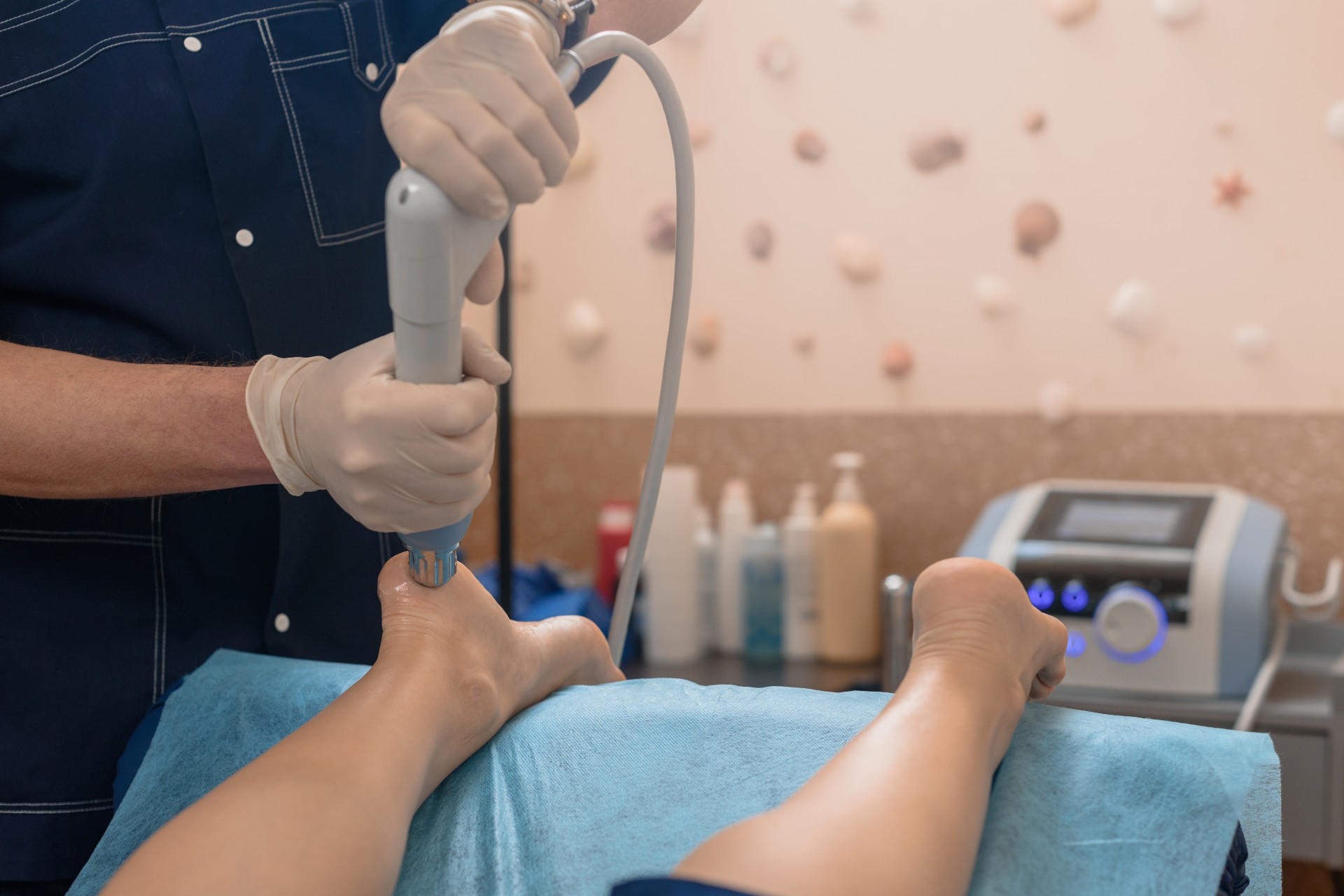Should I Seek EPAT Therapy For My Heel Pain?
Our heels take quite the pounding throughout our lives, no matter if we are children or adults. They literally absorb every single step you take. So, what happens when you start to experience heel pain?
If you have been experiencing heel pain, you may be wondering if Extracorporeal Pulse Activation Technology (EPAT) is for you. Before we go into what EPAT is exactly and the benefits, let’s look at heel pain.
What causes heel pain?
There are a few reasons why you may be experiencing heel pain. One of the most common reasons is plantar fasciitis, which is inflammation of the ligament that runs along the bottom of your foot. This ligament can become irritated and inflamed from overuse or strenuous activity.
Other causes can include Achilles tendonitis, a stress fracture, or heel spurs.
How is heel pain usually treated?
If you are experiencing heel pain, your doctor will likely recommend over-the-counter anti-inflammatory medications, such as ibuprofen, to help reduce the inflammation. If the pain doesn’t improve after a few weeks, your doctor may prescribe physical therapy or steroid injections.
Then, of course, there is non-invasive EPAT treatment.
Our heels take quite the pounding throughout our lives, no matter if we are children or adults. They literally absorb every single step you take. So, what happens when you start to experience heel pain?
If you have been experiencing heel pain, you may be wondering if Extracorporeal Pulse Activation Technology (EPAT) is for you. Before we go into what EPAT is exactly and the benefits, let’s look at heel pain.
What causes heel pain?
There are a few reasons why you may be experiencing heel pain. One of the most common reasons is plantar fasciitis, which is inflammation of the ligament that runs along the bottom of your foot. This ligament can become irritated and inflamed from overuse or strenuous activity.
Other causes can include Achilles tendonitis, a stress fracture, or heel spurs.
How is heel pain usually treated?
If you are experiencing heel pain, your doctor will likely recommend over-the-counter anti-inflammatory medications, such as ibuprofen, to help reduce the inflammation. If the pain doesn’t improve after a few weeks, your doctor may prescribe physical therapy or steroid injections.
Then, of course, there is non-invasive EPAT treatment.
Let’s look at what exactly EPAT is
EPAT, which is FDA approved, is a highly effective, non-invasive treatment that uses a specific acoustic pressure to accelerate the healing process of damaged tissue. It’s essentially a form of extracorporeal shock wave therapy.
How exactly does EPAT work?
The pressure waves generated by EPAT stimulate the body’s metabolism, which in turn increases blood circulation. The increased blood flow carries oxygen and other nutrients to the damaged tissue, which helps to accelerate the healing process.
EPAT basically triggers your body’s natural healing processes so that you can heal faster and better.
Is EPAT safe?
As we mentioned above, EPAT is FDA-approved and is a safe treatment. The treatment has essentially no risks or side effects, including no risk of infection or scarring. EPAT has undergone extensive testing around the world.
It should however be avoided by pregnant women as it has never been tested or approved for such patients.
As the treatments usually only last between ten and fifteen minutes, with no anesthesia, it is becoming more and more popular as an alternative to injury and pain treatment.
When will your heel pain subside after undergoing EPAT treatment?
Most patients experience relief after 3 treatments, but the number of treatments required may vary depending on the individual’s condition. Often, patients do notice pain relief after the very first session.
The treatments are usually 7-10 days apart, and most professionals recommend taking up to 5 treatments.
What is post-treatment care?
After undergoing EPAT treatment, it is important to avoid anti-inflammatory medications for at least 2 weeks prior to and four weeks after treatment.
Tips to avoid getting heel pain again
When it comes to avoiding heel pain altogether, there are a few things you need to know. Take a look at this list:
- Wear shoes that fit well and have good arch support
- Do not go barefoot, especially on hard surfaces
- Stretch your calf muscles regularly
- Ice your heels after strenuous activity
- Take periodic breaks when standing or walking for long periods of time
- Use a heel cushion or pad in your shoes
If you follow these simple tips, you can help avoid heel pain altogether!
Now that we know what EPAT is and the benefits, let’s look at some frequently asked questions:
Frequently asked questions about EPAT
What is the difference between EPAT and other types of shockwave therapy?
EPAT is shockwave therapy. As we mentioned above, it’s a highly effective, non-invasive treatment that uses a specific acoustic pressure to accelerate the healing process of damaged tissue.
Does EPAT treatment hurt?
Not usually. In some cases, there are patients who have reported minor discomfort, redness, or bruising straight after having the treatment.
How is EPAT treatment performed?
A gel is generally applied to the treatment area, and then pressure waves are released through the applicator. It is then moved over to the area that requires treatment. It usually takes between ten and fifteen minutes per session.
Who is a good candidate for such treatment?
The truth is that most people are. It is however recommended that those who are pregnant, have cancer or a pacemaker should rather not engage in EPAT treatments. It is advisable to always consult with your doctor before having EPAT treatment.
Choose Restore Podiatry to fix your heel pain with safe and non-invasive EPAT treatment
Don’t let heel pain get you down when there is a simple, quick, and non-invasive option available with EPAT treatment.
Our experienced, compassionate, and friendly team will talk you through the process and make sure that you are 100% comfortable. At Restore Podiatry, EPAT is administered by Dr. Bhela, so you can rest assured that you are in the safest of hands.
If you are ready to do something about your heel pain, contact Restore Podiatry today at (516) 806-2200 or send us your details here.
Remember, healthy feet are happy feet!

